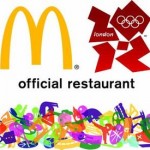 This is not the first Olympics that I have noted the irony of what the games represent versus what the Olympic sponsors represent. The athletes competing are the best in the world, spending years training and pushing their bodies to the limit. I guarantee these athletes are not patronizing McDonalds, snacking on chocolate bars, and washing it all done with 32 0z of Coca Cola. Yet, McDonalds has built a two story restaurant in Olympic Park, the largest in the world, that can serve 1200 customers per hour. Coca Cola and Cadbury Chocolate have also paid big bucks to plaster their names around the festivities. Oddly though these games, featuring those who are the epitome of a fit lifestyle, are sponsored by companies that promote poor eating habits, overly processed and sugary food, and are a major cause of rising obesity rates.
This is not the first Olympics that I have noted the irony of what the games represent versus what the Olympic sponsors represent. The athletes competing are the best in the world, spending years training and pushing their bodies to the limit. I guarantee these athletes are not patronizing McDonalds, snacking on chocolate bars, and washing it all done with 32 0z of Coca Cola. Yet, McDonalds has built a two story restaurant in Olympic Park, the largest in the world, that can serve 1200 customers per hour. Coca Cola and Cadbury Chocolate have also paid big bucks to plaster their names around the festivities. Oddly though these games, featuring those who are the epitome of a fit lifestyle, are sponsored by companies that promote poor eating habits, overly processed and sugary food, and are a major cause of rising obesity rates.
Health campaigners have rightly been dismayed. On June 20, the London Assembly (an elected body that scrutinizes the work of the Mayor of London) passed a motion urging the International Olympic Committee (IOC) to adopt strict sponsorship criteria that exclude food and drinks companies strongly associated with high calorie brands and products linked to childhood obesity. Meanwhile, the UK’s Academy of Medical Royal Colleges has said that the presence of McDonald’s and Coca-Cola at the 2012 Games sends out the wrong message to children.
The Lancet July 21, 2012
Don’t expect major changes anytime soon. McDonalds and Coca Cola are under contract until 2020 and a statement from the IOC (International Olympic Commitee) president Jacques Rogge says, “We are proud to work with them both [McDonalds and Coca Cola]….”
Not only will spectators be subjected to images of Big Macs and ice cold sodas, but the only food choice within the secured ticket holder area is, you guessed it, McDonalds. It is also pertinent to note that spectators should expect 2 1/2 hour delays to enter due to the high level of security and outside food will not be permitted, leaving the hungry patron with few options. That is a lot of sponsorship money to get such exclusive rights, I doubt any health food company could compete.
On the brighter and sustainability side, due to pressure from the London Olympic Committee, the fast food giant did agree to source all their chicken locally, use 75% recycled materials, and convert the used cooking oil into biodiesel for all their Olympic outlets.
With an entire planet tuning in watch and cheer for their nations, with children everywhere emulating their local heroes on the field (pool, etc.), this is the perfect venue to promote healthy, sustainable food sources to a world that has increasing forgotten that food no longer grows on trees, but inside labs and feedlots.
The Lancet, an online series of medical journals, recently published a 5 part series exploring physical inactivity, for those interested or to read the entire article that contains the above excerpt, visit Chariots of Fries.







Thank you for your sharing. I am worried that I lack creative ideas. It is your article that makes me full of hope. Thank you. But, I have a question, can you help me?